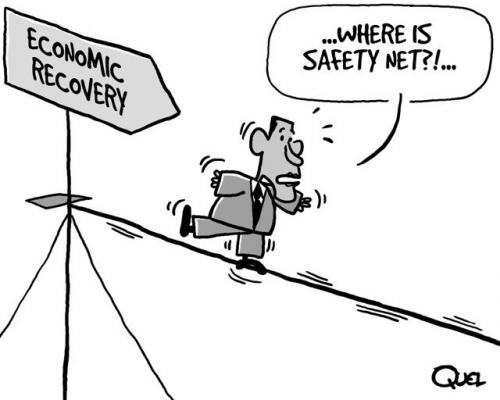Tug of War: Greed vs. Fear
In my journey of investing in the stock market, I realize now that the most difficult aspect of investing is not the technical evaluations (i.e. P/E, valuation models, CAPM or the ilk). The most difficult thing about investing is managing one's emotions!
Predominantly, it's about managing two conflicting emotions that are often two sides to the same coin. Namely this consists of both FEAR and GREED. I shall start with the emotion of FEAR first.
Fear
Fear is the state of mind where one is afraid. There is a mind-numbing feeling of paralysis. It is a situation where one thinks... "I know what I should be doing but... somehow, I'm not doing it". I freely admit that my personality falls into this category. The fearful investor is one that DISLIKES losing, meaning any losses, even on paper is a painful experience.
If you are the fearful type of investor, then it is important to remember the following:
(a) The Price of Inaction
We are no longer in the age of stability. This is the age of chaos where volatility and change is the only constant. Much like the chaos during the Three Kingdoms era at the end of the Han Dynasty, the price of inaction is defeat. One must seize the day when the time is right. To do nothing is safe but the price that one pays might be the death by a thousand cuts. If you've through research and analysis, then one must be persistent enough to commit to it. Nothing comes without risk. Inaction itself, is a form of risk. In financial terms, it is a slow death through inflation.
(b) Know Thyself, Know Thy Enemy
In Sun Tzu's Art of War, it is said that:
"Know Thyself, Know Thy Enemy, A Hundred Battles, A Hundred Victories"
Trying to apply this in stock market investment is not an easy task. However, NOT applying this principle in stock market investing may lead to disastrous consequences. Earlier in 2009 at the height of the Financial Crisis, I performed quite a number of financial analysis on the value of certain counters on the Bursa. Even though I found a number that was quite undervalued, I only invested in a small portion of my cash in them. Why? Fear.
Upon hindsight, I realize that although I knew the Enemy ... meaning I performed a reasonably detailed financial analysis, I failed to know Myself. Self-doubt, paralysis and pride (i.e. fear of losing) caused me to let the opportunity slip by. It's a costly mistake, but one that I'm determined to learn from.
(c) Remember the Simile of the Lute
Both Fear and Greed are servants to the Mind. The servants should not control the Master. The wise one is one who can master both these servants to his advantage. In investing, it is as difficult as walking on a tightrope whilst being pulled on either side by both Fear and Greed. In times like this, the best principle I can think of is to abide by the Buddha's advice., that is to follow the Middle Path of Moderation.
"The Buddha once had a disciple by the name of Sona who practised meditation so intensely that he could not progress in his meditation. He began to think of abandoning his life as a monk. The Buddha, who understood his problem, said to him, "Sona, before you became a monk you were a musician". Sona said that was true. So the Buddha said, "As a musician which string of the lute produces a pleasant and harmonious sound. The over-tight string?" "No," said Sona, "The over-tight string produces an unpleasant sound and is moreover likely to break at any moment." "The string that is too loose?" Again, "No, the string that is too loose does not produce a tuneful sound. The string that produces a tuneful sound is the string that is not too tight and not too loose." So here the life of luxury is too loose, without discipline."
Conclusion:
This post should serve as a reminder that one should neither be TOO prudent nor TOO greedy irregardless whether it is good times or bad. A clear mind is the greatest asset can possess in investing. Neither technical knowledge nor insider information can be equal to that.







